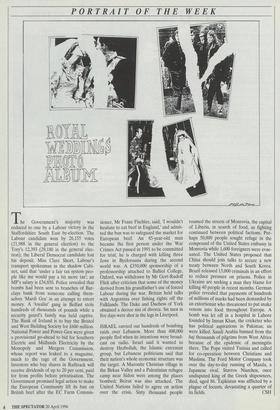PORTRAIT OF THE WEEK
The Government's majority was reduced to one by a Labour victory in the Staffordshire South East by-election. The Labour candidate won by 26,155 votes (21,988 in the general election) to the Tory's 12,393 (29,180 in the general elec- tion); the Liberal Democrat candidate lost his deposit. Miss Clare Short, Labour's transport spokesman in the shadow Cabi- net, said that 'under a fair tax system peo- ple like me would pay a bit more tax'; an MP's salary is £34,850. Police revealed that bombs had been sent to branches of Bar- clays bank from someone calling them- selves 'Mardi Gra' in an attempt to extort money. A 'loyalist' gang in Belfast stole hundreds of thousands of pounds while a security guard's family was held captive. The Bank of Ireland is to buy the Bristol and West Building Society for £600 million. National Power and Power-Gen were given a provisional go-ahead to bid for Southern Electric and Midlands Electricity by the Monopoly and Mergers Commission, whose report was leaked to a magazine, much to the rage of the Government. Investors who buy shares in Railtrack will receive dividends of up to 20 per cent, paid for from profits before privatisation. The Government promised legal action to make the European Community lift its ban on British beef after the EC Farm Commis- sioner, Mr Franz Fischler, said, 'I wouldn't hesitate to eat beef in England,' and admit- ted the ban was to safeguard the market for European beef. An 85-year-old man became the first person under the War Crimes Act passed in 1991 to be committed for trial; he is charged with killing three Jews in Byelorussia during the second world war. A £350,000 sponsorship of a professorship attached to Balliol College, Oxford, was withdrawn by Mr Gert-Rudolf Flick after criticism that some of the money derived from his grandfather's use of forced Labour during the war. Britain held talks with Argentina over fishing rights off the Falklands. The Duke and Duchess of York obtained a decree nisi of divorce. Six men in five days were shot in the legs in Liverpool.
ISRAEL carried out hundreds of bombing raids over Lebanon. More than 400,000 people fled when its intentions were broad- cast on radio. Israel said it wanted to destroy Hezbollah, the Islamic extremist group, but Lebanese politicians said that their nation's whole economic structure was the target. A Maronite Christian village in the Bekaa Valley and a Palestinian refugee camp near Sidon were among the places bombed; Beirut was also attacked. The United Nations failed to agree on action over the crisis. Sixty thousand people roamed the streets of Monrovia, the capital of Liberia, in search of food, as fighting continued between political factions. Per- haps 50,000 people sought refuge in the compound of the United States embassy in Monrovia while 1,600 foreigners were evac- uated. The United States proposed that China should join talks to secure a new treaty between North and South Korea. Brazil released 13,000 criminals in an effort to reduce pressure on prisons. Police in Ukraine are seeking a man they blame for killing 40 people in recent months. German police revealed that payments of hundreds of millions of marks had been demanded by an extortionist who threatened to put snake venom into food throughout Europe. A bomb was let off in a hospital in Lahore founded by Imran Khan, the cricketer who has political aspirations in Pakistan; six were killed. Saudi Arabia banned from the haj thousands of pilgrims from West Africa because of the epidemic of meningitis there. The Pope visited Tunisia and called for co-operation between Christians and Muslims. The Ford Motor Company took over the day-to-day running of Mazda, a Japanese rival. Stavros Niarchos, once undisputed king of the Greek shipowners, died, aged 86. Tajikistan was afflicted by a plague of locusts, devastating a quarter of


































































 Previous page
Previous page